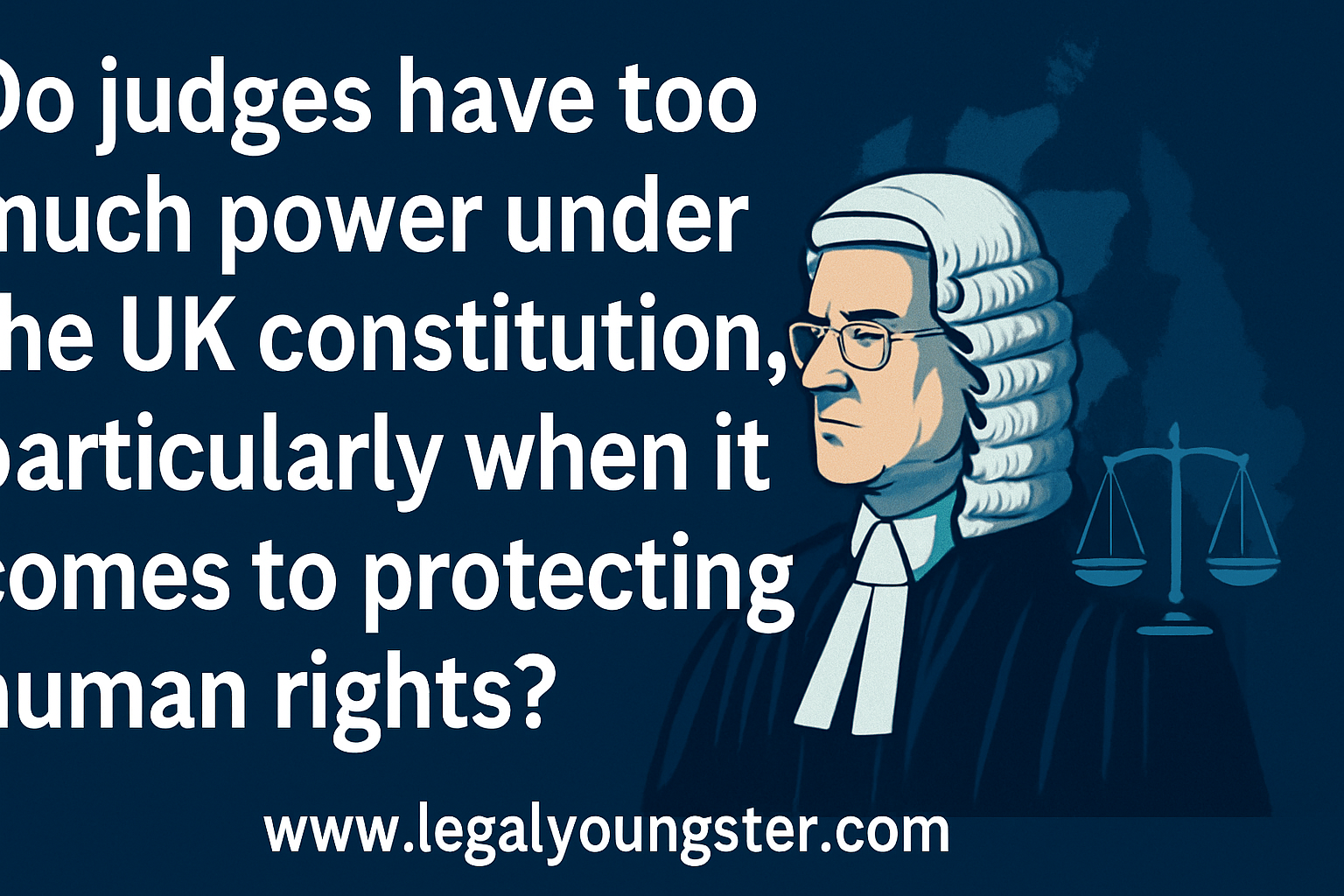



Author: Amy Mathew
University: Queen’s University Belfast
Introduction: The Judiciary and Human Rights in the UK Constitution
The authority exercised by judges in adjudicating human rights cases has consistently been a topic of considerable debate. Up until the Human Rights Act 1998 was introduced, the rights of citizens were protected by the courts through common law. The courts interpreted the legislation in a manner that Parliament had no intention of encouraging public bodies to violate the law. However, the courts were restricted to reviewing the decisions and acts of public bodies. Parliamentary decisions were not to be reviewed in order to protect the constitutional principle, parliamentary sovereignty. This is also emphasised through the legislation, such as Article IX of the Bill of Rights 1689. Hence, the power of the courts was limited and restricted from protecting the fundamental human rights of citizens. Further on, citizens had the option of bringing forward human rights cases to the European Court of Human Rights after the United Kingdom ratified the European Convention on Human Rights This, however, was a time-consuming and extensive process.
From Common Law to the Human Rights Act 1998: A Shift in Judicial Role
As a result, in order to strengthen the protection of citizens’ rights and owing to the ambiguity caused by the absence of a codified statute of rights, the United Kingdom parliament incorporated the fundamental rights enshrined in the European Convention on Human Rights into domestic law through the Human Rights Act statute in 1998. The Human Rights Act is designed to provide the courts with greater involvement in protecting the rights of citizens at the domestic level while preserving parliamentary sovereignty. This paper formidably argues that courts do not hold excessive power under the United Kingdom constitution. Nevertheless, the essay considers the point critically.
First Wave of Parliamentary Scrutiny
Firstly, the Human Rights Act opens the door for the court to review the acts and unlawful decisions undertaken by the parliament or the public authorities through judicial review. The courts can declare the primary legislation issued by the Westminster Parliament incompatible. Secondary legislation, also known as delegated legislation, is primarily issued by the government bodies, devolved institutions, public bodies, and the Crown. Unlike primary legislation, secondary legislation can be struck down, as in the case of HM Treasury v Mohammed Ahmed. In addition, the various administrative law tests, such as the proportionality and unreasonableness tests, lead to intense scrutiny of the government and public bodies’ decisions. This implies that the validity of an Act of Parliament can now be challenged under Human Rights Act grounds. Hence, it can be argued that this places too much power on the judiciary. Moreover, this possibly contradicts Dicey’s view of parliamentary sovereignty.
Declarations of Incompatibility under Section 4 Human Rights Act : Influence without Legal Force
To the contrary, it is necessary to note that restrictions are placed on courts when reviewing primary legislation, even in cases involving human rights violations. Regardless of the atrocity of the violation, the courts are limited to issuing a declaration of incompatibility under section 4 of the Human Rights Act. This provision does not even impose a legal obligation upon Parliament to amend or repeal the relevant legislation. This visibly suggests that the courts do not hold more power than what is required to maintain effective checks and balances. Nevertheless, opponents of the Human Rights Act argue that the power to issue a declaration of incompatibility endows excessive authority in the hands of the courts and explicitly defies Dicean principles. This power is argued to place political pressure on the parliament to amend the existing legislation. Yet again, this interferes with the principle of parliamentary sovereignty, which emphasises that parliament enacts any law it deems appropriate.
Interpreting Legislation under Section 3 Human Rights Act : Judicial Creativity or Overreach
It is crucial to emphasise that the courts strive to avoid declaring incompatibility by attempting to interpret primary and secondary legislation in a manner that aligns with convention rights as required under Section 3 of the Human Rights Act. This can be supplemented with the judgment made in the case R v A [2001] UKHL 25. The defendant was accused of rape. His legal team wanted to cross-examine the complainant about their past sexual relationship to support his defence, particularly regarding consent. When the legislation, Section 41 of the Youth Justice and Criminal Evidence Act 1999, was read literally, it heavily restricted this and was incompatible with Article 6 of the European Convention on Human Rights. However, instead of issuing a declaration of incompatibility under section 4 Human Rights Act , the House of Lords employed section 3 Human Rights Act to reinterpret section 41. They read in an exception, allowing evidence of past sexual history when it was so relevant to the issue of consent that excluding it would endanger the fairness of the trial. Such judgements clearly reflect that courts steer clear of opposing Parliamentary legislation as much as possible. In addition, the number of declarations of incompatibility issued by the United Kingdom courts has significantly decreased.This demonstrates that the courts aim to respect the constitutional principles and limit themselves from exercising excessive power while interpreting legislation in a manner that protects the rights.
Judicial Restraint in Political Matters
The United Kingdom courts are also criticised for abusing the power vested in them by involving themselves in political matters. The courts have been subjected to criticism for their judgments regarding the Brexit cases and have been deemed as the “enemies of the people” by major newspapers such as The Daily Mail. This opinion is also reflected in the argument made by Lord Sumption, who argued that it is beyond the powers of the courts to interfere in political and moral dilemmas. However, in the context of the Human Rights Act , courts generally refrain from interfering in matters of public policy or politics. This can be supplemented with the ruling in the case of Bellinger v Bellinger, where the House of Lords determined that it could only issue a Declaration of Incompatibility under section 4 of the Human Rights Act , leaving it to Parliament to enact legislation. While the government acknowledged that “section 11(c) of the Matrimonial Causes Act 1973 conflicts with articles 8 and 12 of the European Convention on Human Rights,” it chose not to legislate on the issue, as it was deemed a political matter to be resolved by the House of Commons while respecting parliamentary sovereignty. The government responded to this through the Gender Recognition Act 2004. This demonstrates that in the context of human rights, courts limit themselves to the powers accorded to them by the provisions of the Human Rights Act.
Judicial Restraint in National Security Matters
Furthermore, this mechanism does not grant excessive power to the courts; instead, it functions efficiently, allowing the United Kingdom constitution to evolve and develop according to current societal transformations. In addition, when the case raises concerns about national security issues, the courts apply judicial restraint. This can be supplemented with the case Secretary of State for the Home Department v Rehman . The Home Secretary’s decision to deport Rehman without providing full disclosure of intelligence-based evidence was deemed lawful by the court owing to national security concerns. The court dismissed the appeal, determining that there existed an indirect threat to the United Kingdom, thus rendering it a matter for governmental consideration. This decision clearly demonstrates that the judiciary recognises its boundaries and limitations.
Conclusion: Balance of Power or Constitutional Overreach?
In conclusion, it is necessary to emphasise that protecting the rights of citizens while respecting constitutional principles is challenging. It cannot be overstated that the Human Rights Act was introduced to increase the involvement of the courts in safeguarding the fundamental rights of United Kingdom citizens. Therefore, a definite determination of whether the courts are exercising excessive power to protect rights or simply fulfilling their necessary duties is challenging. Nevertheless, the analyses carried out through this essay clearly lean towards the hypothesis that the courts stay within the powers allotted to them by provisions of the Human Rights Act. The ability of the courts to issue a declaration of incompatibility does not grant the courts excessive power; instead, it enables the judiciary to protect the rights of the citizens in accordance with the framework of the United Kingdom constitution. Moreover, the powers held by the United Kingdom judiciary system are necessary to maintain checks and balances.
Custodial Deaths in India: A Legal and Human Rights Perspective
Bibliography
Primary sources:
Human Rights Act 1998
Secretary of State for the Home Department v Rehman [2001] UKHL 47
Bellinger v Bellinger [2003] UKHL 21
R v A [2001] UKHL 25
HM Treasury v Mohammed Ahmed [2010] UKSC 2
Secondary Sources:
Jonathan Sumption, Trials of the State: Law and the Decline of Politics (Profile Books, 2019).
James Slack, ‘Enemies of the people’ The Daily Mail (3 November 2016) News <https://www.dailymail.co.uk/news/article-3903436/Enemies-people-Fury-touch-judges-defied-17-4m-Brexit-voters-trigger-constitutional-crisis.html> 28th April 2025.
A. V. Dicey, Introduction to the Study of the Law of the Constitution, 8th ed.
Human Rights Joint Committee Contents-https://publications.parliament.uk/pa/jt201415/jtselect/jtrights/130/13006.htm.
Gordon Anthony, Judicial review in Northern Ireland(3rd edn, HART 2024).
Colm O’Cinneide, ‘Human Rights and the UK Constitution’ (2012) BAPC 1 <978-0-85672-605-7> 28 April 2024.
The Constitution Society ‘The Judiciary’.